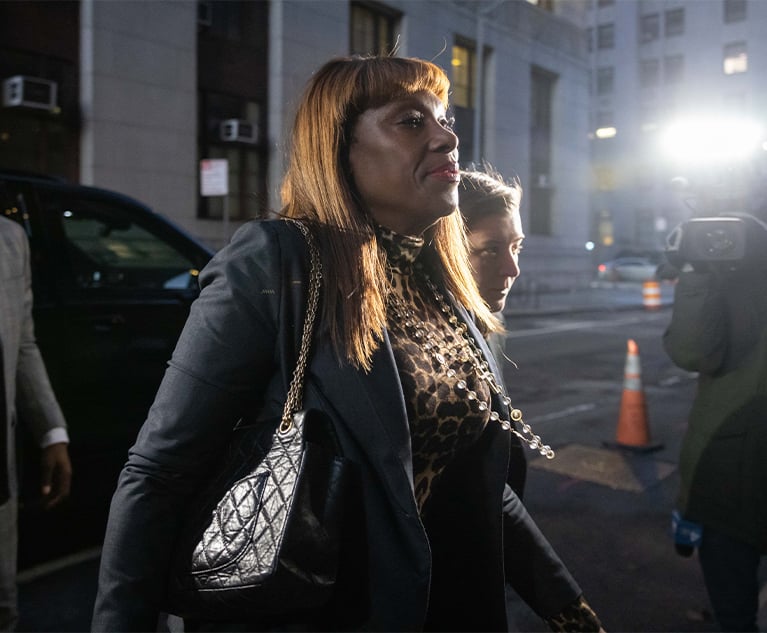NY Plaintiff Sues Opioid Industry on Behalf of Consumers Paying Higher Insurance Premiums
The opioid cases add a new type of plaintiff into the wide-reaching opioid litigation, which have also includes states, Native American tribes, pension funds and hospitals.
May 02, 2018 at 05:13 PM
4 minute read
The original version of this story was published on National Law Journal
 A new wave of plaintiffs have joined the opioid-epidemic litigation with five class actions filed on Tuesday: consumers who claim they're seeing skyrocketing health insurance costs as a result of the crisis.
A new wave of plaintiffs have joined the opioid-epidemic litigation with five class actions filed on Tuesday: consumers who claim they're seeing skyrocketing health insurance costs as a result of the crisis.
The suits, filed in New York and four other states states, were brought by individual persons against opioid manufacturers and distributors, and are among the few class actions filed against drug makers and marketers. The vast majority of cases have been separate actions brought by government entities like cities and counties.
The plaintiffs in this new wave of cases are five persons in New York, New Jersey, Massachusetts, Illinois and California suing on behalf of anyone who has paid increased health insurance costs–including higher premiums, deductibles and co-payments–because of effects attributable to the opioid epidemic, which President Donald Trump has declared a national public health emergency.
The proposed classes include businesses and individuals who paid for health insurance as part of employer-sponsored plans.
“We don't know anyone who in the litigation is addressing the private sector harms to consumers and businesses from increased premiums and other insurance costs that flow to anyone in the health insurance market as a result of the fact that insurers are paying more for addictions,” said Travis Lenkner, one of the plaintiffs attorneys filing the cases.
Lenkner's firm, Chicago-based Keller Lenkner, is one of three plaintiffs firms in the cases. The others are Edelson PC, also based in Chicago, and Consovoy McCarthy Park. Lawyers at those firms, William Consovoy and Jay Edelson, previously worked together on the Spokeo v. Robins case, in which the U.S. Supreme Court found that the plaintiff had to allege an injury that was “particularized” and “concrete” to establish standing to sue in federal courts.
The opioid cases add a new type of plaintiff into the wide-reaching opioid litigation, which have also includes states, Native American tribes, pension funds and hospitals.
John Parker, senior vice president of the Healthcare Distribution Alliance, speaking on behalf of distributors AmerisourceBergen Drug Corp., Cardinal Health Inc. and McKesson Corp., all named in the new cases as defendants, called the opioid epidemic a “complex public health challenge.”
“Given our role, the idea that distributors are responsible for the number of opioid prescriptions written defies common sense and lacks understanding of how the pharmaceutical supply chain actually works and is regulated,” he said in a statement. “Those bringing lawsuits would be better served addressing the root causes, rather than trying to redirect blame through litigation.”
Purdue Pharma spokesman Bob Josephson noted that his company's products account for less than 2 percent of all opioid prescriptions. Johnson & Johnson's Janssen Pharmaceuticals defended the labels on its prescription opioids and called the allegations “baseless and unsubstantiated.”
Representatives of the other manufacturing defendants, which include Endo Health Solutions, Teva Pharmaceutical Industries and Insys Therapeutics Inc., did not respond to requests for comment.
Lenkner said there is more than enough data that links increased health insurance costs to the opioid epidemic.
“It would be up to them to establish that not a penny of the costs for which they are responsible have been passed on to policyholders,” he said of the defendants, “but it's hard to say that with a straight face given the massive costs that are involved.”
The suits cite statistics. In California, for instance, health insurance premiums for family coverage increased 233.5 percent from 2002 to 2016. Monthly premiums for the plaintiff in that case, Jordan Chu, jumped from $160.52 in 2016 to $240.76 this year. New Jersey residents with private health insurance spent $5,081 in insurance premiums in 2014, up from $2,454 in 2001. And an average family plan in New York with annual costs of $9,439 in 2003 had jumped to $19,375 in 2016.
“And we know from the statistics that the epidemic has only worsened,” Lenkner said. “We know it's only gotten the most expensive in terms of treating the patients in the five years since.”
The suits bring claims under the U.S. Racketeering and Corrupt Organizations Act.
Lenkner said his team plans to file suits in more states and fight transfer of their cases to the Northern District of Ohio, where U.S. District Judge Dan Polster is overseeing the opioid multidistrict litigation, even though they filed the class actions in federal courts.
“There are different issues of fact and law in these cases that are not present in the MDL,” he said.
This content has been archived. It is available through our partners, LexisNexis® and Bloomberg Law.
To view this content, please continue to their sites.
Not a Lexis Subscriber?
Subscribe Now
Not a Bloomberg Law Subscriber?
Subscribe Now
NOT FOR REPRINT
© 2024 ALM Global, LLC, All Rights Reserved. Request academic re-use from www.copyright.com. All other uses, submit a request to [email protected]. For more information visit Asset & Logo Licensing.
You Might Like
View All
Attorneys 'On the Move': Structured Finance Attorney Joins Hunton Andrews Kurth; Foley Adds IP Partner
4 minute read

NY Civil Liberties Legal Director Stepping Down After Lengthy Tenure

Former Top Aide to NYC Mayor Is Charged With Bribery Conspiracy
Trending Stories
Who Got The Work
Michael G. Bongiorno, Andrew Scott Dulberg and Elizabeth E. Driscoll from Wilmer Cutler Pickering Hale and Dorr have stepped in to represent Symbotic Inc., an A.I.-enabled technology platform that focuses on increasing supply chain efficiency, and other defendants in a pending shareholder derivative lawsuit. The case, filed Oct. 2 in Massachusetts District Court by the Brown Law Firm on behalf of Stephen Austen, accuses certain officers and directors of misleading investors in regard to Symbotic's potential for margin growth by failing to disclose that the company was not equipped to timely deploy its systems or manage expenses through project delays. The case, assigned to U.S. District Judge Nathaniel M. Gorton, is 1:24-cv-12522, Austen v. Cohen et al.
Who Got The Work
Edmund Polubinski and Marie Killmond of Davis Polk & Wardwell have entered appearances for data platform software development company MongoDB and other defendants in a pending shareholder derivative lawsuit. The action, filed Oct. 7 in New York Southern District Court by the Brown Law Firm, accuses the company's directors and/or officers of falsely expressing confidence in the company’s restructuring of its sales incentive plan and downplaying the severity of decreases in its upfront commitments. The case is 1:24-cv-07594, Roy v. Ittycheria et al.
Who Got The Work
Amy O. Bruchs and Kurt F. Ellison of Michael Best & Friedrich have entered appearances for Epic Systems Corp. in a pending employment discrimination lawsuit. The suit was filed Sept. 7 in Wisconsin Western District Court by Levine Eisberner LLC and Siri & Glimstad on behalf of a project manager who claims that he was wrongfully terminated after applying for a religious exemption to the defendant's COVID-19 vaccine mandate. The case, assigned to U.S. Magistrate Judge Anita Marie Boor, is 3:24-cv-00630, Secker, Nathan v. Epic Systems Corporation.
Who Got The Work
David X. Sullivan, Thomas J. Finn and Gregory A. Hall from McCarter & English have entered appearances for Sunrun Installation Services in a pending civil rights lawsuit. The complaint was filed Sept. 4 in Connecticut District Court by attorney Robert M. Berke on behalf of former employee George Edward Steins, who was arrested and charged with employing an unregistered home improvement salesperson. The complaint alleges that had Sunrun informed the Connecticut Department of Consumer Protection that the plaintiff's employment had ended in 2017 and that he no longer held Sunrun's home improvement contractor license, he would not have been hit with charges, which were dismissed in May 2024. The case, assigned to U.S. District Judge Jeffrey A. Meyer, is 3:24-cv-01423, Steins v. Sunrun, Inc. et al.
Who Got The Work
Greenberg Traurig shareholder Joshua L. Raskin has entered an appearance for boohoo.com UK Ltd. in a pending patent infringement lawsuit. The suit, filed Sept. 3 in Texas Eastern District Court by Rozier Hardt McDonough on behalf of Alto Dynamics, asserts five patents related to an online shopping platform. The case, assigned to U.S. District Judge Rodney Gilstrap, is 2:24-cv-00719, Alto Dynamics, LLC v. boohoo.com UK Limited.
Featured Firms
Law Offices of Gary Martin Hays & Associates, P.C.
(470) 294-1674
Law Offices of Mark E. Salomone
(857) 444-6468
Smith & Hassler
(713) 739-1250






